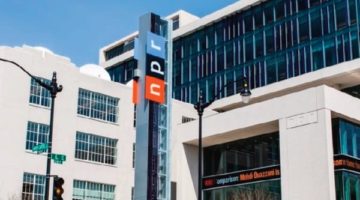 NORTH CENTRAL MIAMI-DADE — As U.S. Rep. Frederica S. Wilson, D-Fla., read a proclamation honoring the Florida Caribbean Students Association, Dwight Powell listened quietly and proudly from the front row.
NORTH CENTRAL MIAMI-DADE — As U.S. Rep. Frederica S. Wilson, D-Fla., read a proclamation honoring the Florida Caribbean Students Association, Dwight Powell listened quietly and proudly from the front row.
“That brought tears to my eyes,” said Powell, who founded the student association in 1991 while he was a senior at Florida State University in Tallahassee.
On Saturday, Wilson, who represents parts of Miami Dade and Broward counties, applauded the FCSA at its 40th conference held at the North Campus of Miami Dade College, the conference host. The 23-year-old group previously held its conferences twice a year before scaling back in 2008 to annual gatherings.
Joined by several South Florida-based Caribbean consuls general, Miami Dade College and locally elected officials, more than 600 students carrying colorful flags from their respective countries packed the breezeway of the Science Complex on the North Campus for a keynote address from Caribbean musician and entertainer Machel Montano.
Montano, 39, wowed the audience with an impassioned speech in which he spoke, sang, danced and urged them to celebrate their heritage.
Think of yourselves not just being from your country but from the region, he said, a sentiment echoed by several student and community leaders throughout the event.
“I was born in Trinidad and Tobago,” Montano said to a chorus of applause from fellow Trinidadians in the audience. He attended Mona Preparatory School in Jamaica, he said, to boisterous approval from the Jamaicans.
“But I consider myself a Caribbean man,” he added. “We are one by history, by blood, sweat and tears.” Caribbean unity has been at the heart of the organization since its inception, Powell said. At the first conference in Tallahassee, 46 students gathered and drafted the group’s constitution.
“I thought how great would it be to create a statewide organization,” said Powell, 44, an event planner and Miami resident. “I wanted the association to serve as a support agency for kids coming over from their respective countries.”
According to recent statistics, the number of black immigrants to the United States more than doubled between 1980s and 1990s and tripled between 1980 and 2005. Researchers say people of African ancestry from the Caribbean accounted for 70 percent of black immigration, with about two-thirds of foreign-born blacks coming from the Caribbean and Latin America.
Many immigrants then and now sought out Miami Dade College, said Miguel Murphy, faculty advisor to Tropical Beat, the college’s Caribbean student organization.
“I can safely say that, with nearly 20,000 Caribbean students, Miami Dade College enrolls the largest number of Caribbean students in the United States,” said Murphy, an MDC graduate who was born in Dominica and came to Miami in 1998 at age 16. Most of the students are from Cuba and Haiti, Murphy said. There is also large representation from the Dominican Republic, Jamaica, Puerto Rico and the Bahamas.
The 20,000 number, he said, represents immigrants directly from the Caribbean, not students who are born in the United States. If those students are included in the count, the number would rise to about 40,000, he said.
The most dramatic difference in the FCSA’s membership over the years, Powell said, is that most of the students who participated in the group two decades ago came directly from Caribbean countries. Today, most of them were born in the United States, said Powell, a Bahamian native.
“They are kids of Caribbean people. Some of them have not been to the Caribbean,” Powell said, which gives the organization an even more important challenge: “re-instilling their Caribbean heritage.”
The Florida Caribbean Students Association functions as an umbrella organization, comprising 28 Caribbean student groups, and thousands of students of Caribbean descent at colleges and universities across the state.
The FCSA also has strong ties with Caribbean student associations in other states, including schools in Georgia, New York, Massachusetts, Washington, D.C., and Connecticut, said Marlon Hill, one of the organization’s founding members.
Hill, who is from Jamaica, attended the FCSA’s first conference when he was a student at Florida State with Powell and was on hand for this 40th gathering.
“This conference was an epic opportunity for the students to hear from one of the most transformative Caribbean artists of our time,” said Hill, referring to Montana. “They received an authentic sense of his purpose, faith, work ethic and secrets to a life of success,” said Hill, a lawyer who has advised the FCSA for for the past 10 years.
Fabrice Stuart, FCSA president, agreed that the three-day meeting was a success. “The hard work really paid off,” said Stuart, who attends the Broward College Central Campus in Fort Lauderdale.
The conference, which included workshops on careers, networking and motivation, provided students with role models, an important message for Caribbean students, said Christian Hughes, the conference director and a member of Tropical Beat at MDC where she is a sophomore interested in nursing.
“One thing I have learned is that you need to network,” Hughes said. “When you build connections, it benefits you in the long run. We have plenty – dozens of people – who say they want to help us.”
The role models were plentiful at Saturday’s keynote address, including Wilson, whose family is from the Bahamas; Malou C. Harrison, president of Miami Dade College North Campus, who was born in Jamaica of a Trinidadian father and a Guyanese mother ; and Alexandra Davis, vice mayor of Miramar, who was born in London and grew up and attended school in Jamaica.
“Our theme for the conference this year is ‘Empowering the Next Generation of Caribbean Leaders,’‘’ said Ashley McHayle, the FCSA’s public relations officer.
“Caribbean people are more than our music and more than the negative connotations that people portray us as,” said McHayle, a junior psychology major at Florida International University. “We have established ourselves as lawyers, doctors, and in business. We are the next generation of leaders who are going to make our mark in the United States.”












No Comment